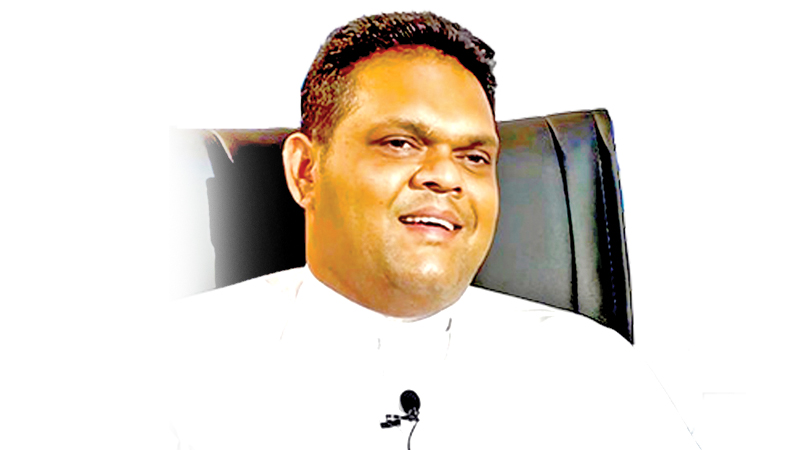
 In a candid interview with the Sunday Observer following Budget 2024, State Minister of Finance, Shehan Semasinghe, shares insights into the Government’s economic strategies and addresses key concerns raised by the public and the Opposition.
In a candid interview with the Sunday Observer following Budget 2024, State Minister of Finance, Shehan Semasinghe, shares insights into the Government’s economic strategies and addresses key concerns raised by the public and the Opposition.
From managing the Cost of Living (COL) to navigating the intricacies of foreign debt restructuring and seeking support from international institutions, the State Minister provides a comprehensive overview of the Government’s plans and actions. Delving into the proposed budget, revenue targets, and the utilisation of funds from the Asian Development Bank (ADB), Minister Semasinghe articulates the rationale behind recent crucial financial decisions.
Q: How does the Government plan to increase the COL allowance for public servants by Rs.10, 000 and will this involve imposing additional tax burdens on all citizens?
A: The Government has already incorporated the COL allowance into the budget. The emphasis now lies in effective execution rather than theoretical formulation. The critical factor is implementation, and we recognise the need for individuals who can turn words into tangible actions.
While constructive criticism is valued, it should be complemented by a commitment to delivery. Despite the Parliamentary scrutiny faced by the 2023 Budget, it played a crucial role in stabilising the country. The 2024 Budget, with its intense focus on fostering economic growth, signifies a positive trajectory for the nation. There are no plans to introduce new taxes as such – the proposed measures are already part of the established Budget.
Q: Trade Unions advocate for a Rs, 20,000 increase in the COL allowance and threaten trade union action. How does the Government respond to this demand?
A: While trade unions play a significant role as stakeholders, it is crucial to clarify their role. Governance remains the responsibility of the Government, and we are open to constructive dialogue with all trade unions from various sectors.
Flexibility has been demonstrated in addressing their concerns. However, trade unions need to grasp the broader repercussions of actions that may destabilise the country and erode the economy.
The Government is accountable for the well-being of 22 million citizens, and we prioritise open communication. We have actively addressed pressing issues over the past 12 months and welcome constructive suggestions for continuous improvement from any quarter.
It is our commitment to govern responsibly under the leadership of President Ranil Wickremesinghe, ensuring the stability and prosperity of our nation.
Q: Are there any plans to reduce the Government workforce?
A: As of now, there are no plans to reduce the Government workforce, although some economists have suggested that. Recruitment has been minimal, with exceptions for essential positions in the Department of Health.
Government expenditure is being rigorously controlled. However, a significant challenge arises from the growing interest payments, primarily due to debt servicing, starting in 2024.
To counter this, the Government is focusing on increasing revenue, targeting 15 percent of the Gross Domestic Product by 2025. Efforts will be made to expand the tax net, introducing a more robust and user-friendly system through the Inland Revenue Department (IRD).
Q: Economic experts argue that the Government’s revenue targets are perhaps too ambitious. What is your take on this?
A: Indeed, the revenue targets are ambitious, reflecting the ambitious nature of the overall economic program. It is essential to remember the challenging starting point we faced, operating in a deficit condition in 2022.
Over the past 15 months, we have witnessed a remarkable transformation, overcoming electricity shortages, gas unavailability, fertiliser scarcity, and import restrictions.
Inflation, once at 70 percent, has now stabilised at just 1.5 percent, and food inflation has dropped from 95 percent to minus 5 percent. The Government is aware of the cautious approach required, emphasising that criticism alone is insufficient. Concrete, credible proposals are essential for the country’s progress.
The Government remains focused on its targets, having navigated through the most challenging period. Efforts are under way to restructure external debt, optimise local debt, and engage positively with global financial institutions for debt resolution. Confidence is high that the second tranche of International Monetary Fund (IMF) funds will be received soon, strengthening the country’s economy. The Government urges a prioritisation of the nation over political considerations for sustained progress. We need that cooperation from all sides.
Q: Could you explain the rationale behind the proposed Rs.3 trillion allocation for foreign debt restructuring and settlement of International Sovereign Bonds (ISBs)?
A: The recent enhancement of the borrowing limit, about two months ago, was not an indication of additional borrowing but a legal requirement for fiscal space. This space is crucial for the conversion of existing bonds, and Parliamentary approval is essential for this fiscal manoeuvre. The increase granted flexibility for the local debt optimisation program.
Similarly, the proposed Rs.3 trillion is not an attempt to borrow but a necessary step for restructuring. Of this, Rs.450 billion aims to recapitalize the banking sector, enhancing credibility and confidence. The core purpose of the Rs.3 trillion allocation is to restructure ISBs into long-term bonds, crucial for the comprehensive debt restructuring process.
Q: How does the Government plan to manage the increased borrowing limit and its impact on the country’s fiscal health?
A: The increased borrowing limit is not indicative of an intention to borrow more – it is actually a fiscal tool essential for the restructuring process.
Without this expanded limit, restructuring, especially of ISBs, would be impeded. Restructuring is paramount for the country’s fiscal health, and this step is not about seeking additional funds but about strategically managing the existing debt.
The Government is razor-focused on mitigating the adverse effects and ensuring a seamless process that safeguards the stability of the local banking sector after ISB restructuring.
Q: How does the Government plan to ensure the effective utilisation of the Rs.30 billion support from the ADB?
A: The strategy involves a two-fold approach. Of the Rs.30 billion, Rs.15 billion is designated for credit guarantee institutions, with a focus on assisting the Small and Medium Enterprises (SME) sector. Out of this, funds will be allocated to provide credit guarantees to SMEs, enabling their access to finance, particularly from January onwards. This initiative addresses the current challenges faced by the SME sector in securing further funding.
The remaining monies are earmarked for concessional loans, negotiating with the ADB for single-digit SME loans and reinforcing financial support to this vital sector.
Q: What is the strategy behind the allocation of Rs. 3 billion for a National Centre for Artificial Intelligence (NCAI) and how does it align with the Government’s vision for a Digital Economy which the President is very keen about?
A: The allocation of Rs. 3 billion for a NCAI aligns with the global shift towards rapid AI adoption. Recognising our lag in this sphere, the Government aims to foster more technological advancements. The establishment of the NCAI is a pivotal step in ensuring that Sri Lanka is not left behind in harnessing the potential of advanced AI, thereby contributing to the realisation of the Government’s vision for a Digital Economy or Digi-Econ.
Q: The Opposition says the budget was virtually drafted by the IMF and the World Bank. What is your comment on this?
A: None of the International Institutions directly drafts the budgets for any country. While there is a framework approved by Parliament, the Opposition’s claim that the budget is being drafted by the IMF is inaccurate. Seeking IMF assistance has been openly debated in Parliament, and it is no secret that such assistance is being sought.
The Opposition’s stance appears contradictory, as they previously advocated approaching the IMF and seeking its help to ride out the economic storm. Our decisions are based on a commitment to strengthen and sustain the economy, not for political popularity.
The Opposition’s criticisms seem to be more about verbal rhetoric than offering constructive plans for the country’s economic well-being. That is not what we want – we seek their cooperation to extricate the country from the present economic situation.







